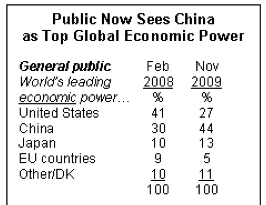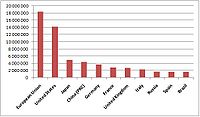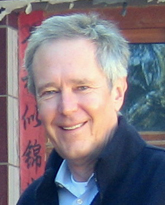
One of the great pleasures I derive from blogging here is receiving feedback from knowledgeable and thoughtful readers. One such reader — a person who has asked not to be identified — wrote in to correct my Dec. 11 post about American misperceptions of Chinese economic might.
As you’ll recall, I linked to a post by the inimitable James Fallows, in which he pointed out a recent Pew report about American views on global economic power.
The report found that 44 percent of Americans think that China — not the U.S. — is the “top global economic power.” This despite the fact that in addition to other telling factors, China’s GDP is less than one third of America’s. (See chart on the right.)
As it happens, there’s more to the story. As the reader pointed out in an email to me, the issue is not merely the 44 percent of those surveyed who picked China. In addition, it’s telling to note that just 5 percent of respondents named the “EU countries.”
Indeed, when it comes to GDP alone, a look at the 2008 numbers from sources like the IMF and the CIA World Factbook demonstrate that the European Union’s collective economy is, in fact, larger than America’s. (See the graph of national GDPs; bigger version here.)

The CIA World Factbook’s 2008 report, for instance, says that the EU’s economy is worth $18.14 trillion — compared to $14.44 trillion for the U.S.
The IMF’s estimate is similar, while the World Bank puts the U.S. ahead of the Eurozone, since the Eurozone excludes the U.K. This Wikipedia page — List of Countries by GDP (nominal) — summarizes of the three reports quite nicely.
Now, back to the Pew report. Let’s not forget that the question was not “which country (or union) has the world’s largest GDP?”
Rather, the question was which country is the “world’s leading economic power.” Since the EU and Eurozone are not a single country, one can argue that they don’t wield as much economic power as the U.S. That’s because America, of course, is a single economic entity, while the EU cannot always act in a unified way based on the desires of its constituent members.
Fascinating stuff.

![A Boutique Cruise on the Yangtze [not my image]](http://farm1.static.flickr.com/176/450674112_40925e7544.jpg)
![The Ryugyong Hotel in Pyongyang, N. Korea [not my image]](http://farm1.static.flickr.com/152/428776769_1c6bf808ec_m.jpg)

